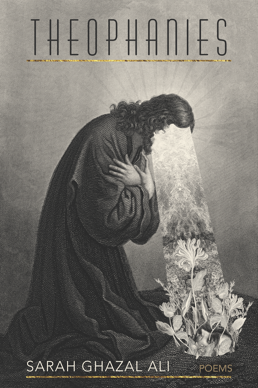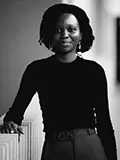
Alice James Books (January 2024)
Sarah Ghazal Ali’s Theophanies is a stunningly lyrical and atmospheric reflection on religion, womanhood, and family. Named for the visible manifestation of deities in tangible form, the collection seems to do exactly that—summon the divine through its exquisite application of language, play with form, fearless beckoning of revered religious characters, and inspiring vulnerability. Through the four sections the collection is divided into, Ali meditates thoroughly and unflinchingly on subjects that are both integral and difficult to talk about.
The inaugural poem “My Faith Gets Grime Under Its Fingers” sets the tone for what is to come. Ali’s faith, her religious adherence, is imperfect—a notion that carries through many of the poems. “I confess to sleeping on my night/blue prayer mat/more often than bent standing in ruku,” she writes, before pivoting towards an interrogation of womanhood within the complexities of our society. She reaches far back in time to make her point: “A woman crowned/ holy is a calamity worth repeating/Eve languished/ motherless among rotting cores/ the sweet stench of fruit flies/at last shown their purpose.” In a move repeated many times in the collection, she further seeks a connection to the matrilineal spiritual and biological line she hails from. “I wonder how/to hallow the women I’ve sprung from.”
This fraughtness of the female experience is more fully explicated in other poems. In one that touches on sexuality, she describes:
My pillaged body
is not as interesting
as my virginal sister’s
I know. Your books
efface me, dismiss me
as naturally lacking.
In another regarding domestic violence, she writes:
And I have seen a plum pucker in a man’s
tight grip, split sudden without protest
on the banks of the Sambre, vermillion
sluicing his arm. Next to him a woman,
obedient window, taught to allow
the outside to participate. I have seen
him stain all but her face—
I have seen her bruiseless face.
But the heaviness of the subject matter is also mediated by portraits of familial love.
At five, my father shows me a color-
codes model of the brain. We take it
apart together, piece by heavy
plastic piece. Blue: temporal
lobe. Burrowed within, a red bean
the amygdala. Like a seed?
Yes, he laughs, where feelings bud.
Although familial relationships are ever thorny—Ali also has verses about her father wanting a son instead of a daughter prior to her arrival—the enmeshment of light and dark, positive and negative, paint a picture of normalcy—of commonplace family life where nothing is ever all good or all bad.
This lightness extends to her masterful use of form. Ghazals permeate the collection—ghazals about the Indian-Pakistani Partition, ghazals about religious faith, ghazals about a television series, and, most charmingly, ghazals about ghazals. In consideration of her matrilineal line, Ali constructs poems in the form of family trees and one, “Matrilineage [Recovered],” leaves nothing but blank space beneath it, making a loud statement about to what she is able to connect.
Of all the many things the collection does well, it is in Ali’s summoning of religious figures that Theophanies comes to take on an ethereality, which is absorbing. Eve, Hagar, Ibrahim, Angel Gabriel, and Maryam, among many others, make an appearance from the pages of the Quran and the bible. In verses which both speak from their perspectives and about their perspectives, she summons their essences into lines of the poems. Gabriel brings missives from the heavens and Sarai suffers under the burden of shaky faith. We are more than just the physical families that make us, Ali communicates deftly. We are the spiritual voices that continually shape us. At any given moment, we are a multiplicity of connections.
Sarah Ghazal Ali is the author of Theophanies (Alice James Books, 2024), selected as the Editors' Choice for the 2022 Alice James Award. A Djanikian Scholar, Stadler Fellow, and winner of the 2022 Sewanee Review Poetry Prize, her poems and essays appear in POETRY, American Poetry Review, The Yale Review, and elsewhere. She is the poetry editor for West Branch and lives in the Bay Area, California.
Zainab Omaki is a PhD student in English, specializing in creative writing (fiction). She has a masters degree in creative writing from the University of East Anglia, where she was the recipient of the Miles Morland African Writers Award. Her work has appeared or is forthcoming from Transition Magazine, Passages North, The Rumpus, and other spaces. Omaki was a 2020/2021 fellow at the Africa Multiple Cluster of Excellence, where she worked on a novel.

